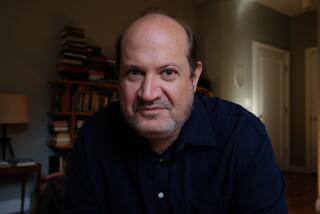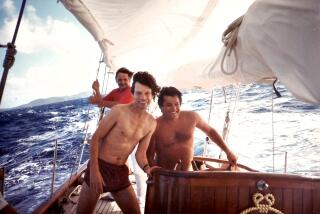The Flip Side of ‘Wiseguy’ : Record Industry Execs Call Rock World Portrayal Cartoonish
- Share via
Rock ‘n’ roll--with its history of payola scandals and drug casualties--is a ripe target for a TV screenwriter, but the rock ‘n’ roll world portrayed on TV’s “Wiseguy” series is little more than an out-of-date comic book.
At least that’s what numerous record industry veterans think after seeing the first two episodes in the CBS cop show’s seven-part dramatization of life in the rock world. In Part 3, which airs tonight at 10 on Channel 2, G-man Vinnie Terranova (Ken Wahl) continues in his undercover plant as head of the floundered Dead Dog Records company in order to blow the lid off rock ‘n’ roll corruption. The cast for these shows also includes rock star Debbie Harry, ex-Eagle Glenn Frey and rocker-actor Tim Curry.
“It’s clearly a cartoon of the record business,” said Bob Merlis, Warner Bros. Records vice president of press and promotions, in a comment typical of executives surveyed by The Times.
In the first two episodes, Terranova takes on the job of running Dead Dog, only to have veteran promotions man Bobby Travis (Frey) push himself upon Terranova and teach him the business. In a whirlwind night, Travis takes Terranova on a tour of the rock world, including stops at a heavy metal club and a sleazy dive, where former superstar singer Diana Price (Harry) has been reduced to singing standards for a sparse, uncaring clientele.
But within 24 hours, a touched Terranova has Price on the comeback trail in the studio with eccentric genius producer Johnny Medley (Paul McCrane). That sets up a confrontation with megalomaniacal record tycoon--and Price’s former lover--Sir Winston Newquay (Curry), who cheated the singer out of a fortune.
That quick turn of events, among other things, severely stretched the credulity of industry insiders.
“Certain things were gross exaggerations,” said Al Coury, general manager of Geffen Records and a 30-year veteran of the record business. “But they have to do that to make it more dramatic. If I were to write a script for it and told the truth, it wouldn’t be believable.”
Of more concern, though, was the image of the industry as being riddled with corruption.
“It’s disappointing the way it portrays the old-time image of the industry--sex, drugs and rock ‘n’ roll and everybody’s a little sleazy,” said David Simone, president of the MCA-distributed Uni label.
“We’re more professional now. On the other hand, the Frey and Wahl characters are painted very well. I don’t see how they can run a company without a secretary, but Wahl could fit in as a record executive.”
Informed of the criticisms, “Wiseguy” executive story editor John Schulian defended the Stephen J. Cannell Productions show’s tone, pointing to headlines in the last two years.
One case that Schulian named as a source of inspiration involved Salvatore Pisello, identified by the FBI as a member of a New York organized crime family. Pisello was convicted in 1988 of tax evasion for not reporting income earned from MCA Records in deals allegedly involving illegal sales of “cutouts,” or discontinued records. In the “Wiseguy” story line, label head Newquay is accused of selling cutouts and cheating singer Price out of her share of millions of dollars in royalties.
“Originally I was just thinking about dealing with payola, which is just the tip of the iceberg,” said Schulian, who gained awareness of the rock world while covering it for the Baltimore Evening Sun in the early-’80s. “How could I not have read about the (payola and corruption) cases in recent years?”
Even if they thought the show was a touch silly, record company executives who had seen the show (only about a third of those contacted by The Times had) thought the portrayal was harmless. No uproar (a la real nurses offended by the characters of the new series “Nightingales”) is in the offing.
What seemed to interest record industry insiders most were the dialogue (given a passing grade for the most part) and characterizations--especially when they thought they saw someone familiar.
The name of A&M;’s vice president of promotions, Charlie Minor, came up several times as the likely inspiration for Frey’s character, but story editor Schulian said he had never heard of Minor.
Minor--considered within the industry to be the quintessential promo man--also dismissed any connection between himself and the fictional Travis.
“He was very shaky,” Minor said of the characterization. “He couldn’t get a job with us now. I never knew anyone who talked like that. And he looked wealthier, healthier and much thinner than most people who do what I do. We travel about nine months a year.”
Minor, too, was put off by the corruption angle.
“In TV and the movies, we always end up ripping off poor people like Debbie Harry. . . . Every business has some corruption and unethical things, but here it’s nothing compared to the ‘Wiseguy’ thing.”
More to Read
The complete guide to home viewing
Get Screen Gab for everything about the TV shows and streaming movies everyone’s talking about.
You may occasionally receive promotional content from the Los Angeles Times.






